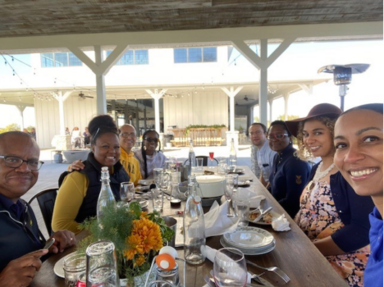
The summer of 2020 brought what University of Iowa pediatric psychologist Joyce Goins-Fernandez, PhD, calls a ‘twindemic’: the rapid spread of COVID-19 coupled with protests and a national outcry for discussions on race, justice, and equality.
“I wanted to check in on the mental health of people of color at that time, so I suggested starting a support group for [UI Carver College of Medicine] faculty of color to see how things were going, especially after the deaths of George Floyd, Ahmaud Arbery, and Breonna Taylor,” says Goins-Fernandez, clinical assistant professor in the Stead Family Department of Pediatrics. “It just seemed like it was non-stop.”
The support group started meeting monthly, and the idea of creating the Black Faculty Council quickly came to the forefront.
“Eventually it became clear that physicians aren’t the types that want to sit around and talk about their feelings,” Goins-Fernandez says. “They want to be action-oriented.”
One of the first things the group tackled was COVID-19 vaccine hesitancy among people of color. After doing some research, Goins-Fernandez says they found that vaccine hesitancy was not only rooted in stigmatization, but also in a lack of accessibility. The council reached out to the UI Mobile Clinic to assist with outreach efforts and created a series of videos describing why members chose to get vaccinated. Goins-Fernandez and colleagues hope to continue developing partnerships with existing community and institutional groups that share common interests.
The council, currently made up of 10 members, plans to continue focusing on recruitment and retention of underrepresented faculty, residents, and students.
“We want to be here for students and trainees in the Carver College of Medicine,” Goins-Fernandez says. “We want to network with them and support them to reach their education and career goals. Sometimes it’s helpful to get mentoring from people outside your department, especially if you’re a person of color, to talk to someone who has been through the process before and can give some extra support.”
To widen the pipeline of Black health care providers in the state, Dionne Skeete, MD, clinical professor of surgery-acute care surgery and secretary of the council, says recruitment is key, and successful recruitment comes with transparent conversations.
“I think what people want to know is: What’s it like to work here? Are you going to get promoted and a fair chance? Is there diversity and awareness? I think we check those boxes. Telling people the answers instead of having them guess or make assumptions is key,” Skeete says.
Among its major goals, the group is building a sense of community among its members with regular (virtual) meet-ups.
“We've had a chance to interact outside of work, and I think that’s helpful in terms of building relationships and getting to know other faculty of color,” Skeete says. “Sometimes at work you only know the people you interact with routinely, and it’s hard to get to know people I never would see during a workday. I think it’s helpful to hear how other people address issues they’ve had, what they do for this big enterprise, and where we go from there.”